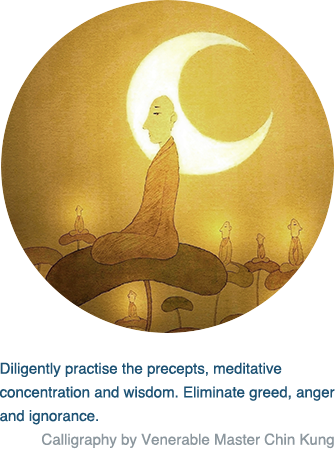


Buddhism is the teaching of truth, virtue, beauty, and wisdom. We thus begin learning Buddhism by paying respects to our teacher—Sakyamuni Buddha, who taught us the fundamental principles of study and practice, the Three Refuges.

First, “being enlightened rather than deluded.” Returning from a state of delusion, to the refuge of our innate enlightenment is termed “taking refuge in the Buddha.”
Second, “correct rather than deviated views.” Rectifying incorrect understanding and views is termed “taking refuge in the Dharma.” The Dharma represents proper views and understanding.
Third, “pure rather than contaminated.” Turning away from contaminations and returning to the innate purity of the mind is termed “taking refuge in the Sangha.” “The Sangha” refers to purity and harmony. Thus Buddhism involves cultivating our enlightened nature, correct understanding, and purity of mind. These Three Refuges are what we return to and rely on.
Indeed, every Dharma method helps us to recover our true nature and realise our innate wisdom, virtue, and abilities. Hence, all Dharma methods are equal. However only one method can be studied at any one time. Learning more than one method simultaneously dissipates our physical and mental energy.
Thus, the principle of Buddhist education is to "specialise in one subject over a long period of time" with the aim of achieving meditative concentration and samadhi; restoring the innate concentration of our true nature; and realising wisdom, which is thoroughly understanding the reality of human life and the universe.
We learn Buddhism to develop wisdom. As stated, "From precepts, meditative concentration arises; from meditative concentration, wisdom arises." By realising wisdom, we will naturally cease delusion, achieve enlightenment, end suffering, and attain happiness. Thus, the Buddha's teachings throughout three hundred assemblies over forty-nine years is summarised as "precepts, meditative concentration, and wisdom." All of the sutras simply provide detailed explanations of the Three Learnings of precepts, meditative concentration, and wisdom.
Where does wisdom come from? Wisdom arises from a pure mind; the pure mind’s function is wisdom. Our minds can be likened to water. When the water is tranquil, the mind is still. Without waves, the surface of the water is like a mirror that clearly reflects the external surroundings. This is wisdom.
Attaining wisdom hinges on meditative concentration, while precepts provide the means. The difference between the infinite Dharma methods lies in the methods themselves, but they share the same objective—attaining meditative concentration to achieve wisdom. What is wisdom? Wisdom is determining precisely, without the slightest inaccuracy.
The objectives of Buddhism and traditional Chinese culture are to realise wisdom rather than mere intellectual development. The Buddhist method of precepts, meditative concentration, and wisdom was welcomed by Confucianism and Taoism after being introduced to China. Results can be achieved within a maximum of ten years. Those of intermediate capacity may take three or four years to achieve meditative concentration. Specialising in one method over a long period of time is the requirement needed to attain meditative concentration and wisdom.
How do Pure Land Buddhist practitioners cultivate? They practise purity, impartiality, and enlightenment. Purity is abiding by the precepts, impartiality is meditative concentration, and enlightenment is wisdom. Cultivation must not deviate from the fundamentals of the Three Learnings—precepts, meditative concentration, and wisdom, which provide the standard for determining what is correct.
In brief, the complete attainment of purity, impartiality, and enlightenment occurs simply by sincerely chanting "Amituofo," the name of Amitabha Buddha, even once. Chanting “Amituofo” just once fully encompasses the practice of precepts, meditative concentration, and wisdom. By ensuring that all wandering thoughts return to “Amituofo,” over time enlightenment is guaranteed.
Thus, the real benefit of learning Buddhism is to cease delusion, realise enlightenment, end suffering. and attain happiness. Progress in one's learning is measured in terms of the daily lessening of worries, increasing of happiness, and development of wisdom.